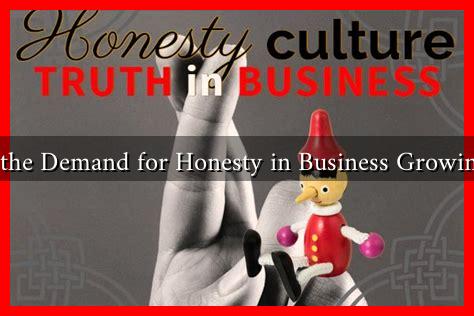-
Table of Contents
Is the Demand for Honesty in Business Growing?
In an era marked by rapid technological advancements and increasing consumer awareness, the demand for honesty in business practices is more pronounced than ever. As businesses navigate the complexities of a global marketplace, the expectation for transparency and integrity has become a critical factor in building trust and loyalty among consumers. This article explores the growing demand for honesty in business, examining its implications, driving forces, and real-world examples.
The Shift Towards Transparency
Over the past decade, there has been a significant shift in consumer expectations regarding corporate behavior. The rise of social media and online reviews has empowered consumers to voice their opinions and hold businesses accountable for their actions. This shift has led to a greater emphasis on transparency and honesty in business practices.
- Consumer Awareness: With access to information at their fingertips, consumers are more informed than ever. They can easily research a company’s practices, values, and reputation before making purchasing decisions.
- Social Media Influence: Platforms like Twitter, Facebook, and Instagram allow consumers to share their experiences, both positive and negative, with a wide audience. A single negative review can significantly impact a company’s reputation.
- Corporate Accountability: Businesses are increasingly held accountable for their actions, with stakeholders demanding ethical behavior and transparency in operations.
Case Studies Highlighting the Importance of Honesty
Several companies have successfully embraced honesty and transparency, reaping the benefits of increased consumer trust and loyalty. Here are a few notable examples:
- Patagonia: This outdoor clothing brand is renowned for its commitment to environmental sustainability and ethical practices. Patagonia’s “Don’t Buy This Jacket” campaign encouraged consumers to think twice before making unnecessary purchases, showcasing the company’s dedication to honesty and environmental responsibility.
- Everlane: Known for its “Radical Transparency” philosophy, Everlane provides detailed information about its production processes, costs, and factory conditions. This approach has resonated with consumers who value ethical fashion and transparency.
- Ben & Jerry’s: The ice cream company has long been an advocate for social justice and environmental issues. By openly discussing its values and initiatives, Ben & Jerry’s has built a loyal customer base that appreciates its honesty and commitment to making a positive impact.
The Role of Millennials and Gen Z
The younger generations, particularly Millennials and Gen Z, are driving the demand for honesty in business. These consumers prioritize ethical considerations in their purchasing decisions and are more likely to support brands that align with their values.
- Value-Driven Purchases: According to a survey by Nielsen, 73% of Millennials are willing to pay more for sustainable offerings, indicating a strong preference for brands that demonstrate honesty and integrity.
- Brand Loyalty: A study by Cone Communications found that 87% of consumers would purchase a product because a company advocated for an issue they cared about, highlighting the importance of aligning business practices with consumer values.
The Consequences of Dishonesty
While the demand for honesty is growing, the consequences of dishonesty in business can be severe. Companies that engage in deceptive practices risk damaging their reputation, losing customer trust, and facing legal repercussions.
- Reputation Damage: A tarnished reputation can take years to rebuild, as seen in the case of Volkswagen’s emissions scandal, which led to significant financial losses and a decline in consumer trust.
- Legal Consequences: Companies that engage in fraudulent practices may face lawsuits, fines, and regulatory scrutiny, further impacting their bottom line.
Conclusion: The Future of Honesty in Business
The demand for honesty in business is not just a passing trend; it is a fundamental shift in consumer expectations. As businesses continue to navigate an increasingly transparent world, those that prioritize honesty and integrity will likely thrive. The examples of companies like Patagonia, Everlane, and Ben & Jerry’s illustrate that embracing transparency can lead to increased consumer loyalty and trust.
In summary, the growing demand for honesty in business is driven by consumer awareness, the influence of social media, and the values of younger generations. Companies that recognize and adapt to this shift will not only enhance their reputation but also contribute to a more ethical and sustainable business landscape. For more insights on corporate transparency, you can visit Transparency International.

